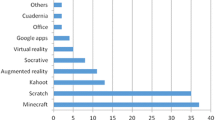Abstract
Digital Game-Based Learning (DGBL) has been attracting increasing attention from researchers and educators, especially as related studies suggest it can enhance learning and positively affect students’ motivation, attitude, self-efficacy, and intention to play similar games. However, research into DGBL is not explicit about the role of fun in DGBL. In our study we hypothesized that the perceived fun while playing with an educational game has a positive impact on children’s measured- and perceived learning, motivation, attitude, self-efficacy and intention to play similar games. We conducted an online survey study with secondary school students (N = 28, mean age = 13.54) before and after playing with an online educational game on the topic of biology. The results indicate that the fun they experience while playing the game has a significant and positive effect on the perceived learning, the change in students’ motivation and self-efficacy, and the intention to play similar games. However, no significant effect was found on the measured learning and the change in attitude towards the subject. Our findings partially support the contention that making DGBL more fun improves learning. Future research should seek further empirical evidence in other topic areas and for different ages, and to explore how DGBL can help improve attitudes towards the topic as well.
Access this chapter
Tax calculation will be finalised at checkout
Purchases are for personal use only
Similar content being viewed by others
References
Erhel, S., Jamet, E.: Digital game-based learning: impact of instructions and feedback on motivation and learning effectiveness. Comput. Educ. 67, 156–167 (2013). https://doi.org/10.1016/j.compedu.2013.02.019
Hainey, T., Connolly, T.M., Boyle, E.A., Wilson, A., Razak, A.: A systematic literature review of games-based learning empirical evidence in primary education. Comput. Educ. 102, 202–223 (2016). https://doi.org/10.1016/j.compedu.2016.09.001
Boyle, E.A., et al.: An update to the systematic literature review of empirical evidence of the impacts and outcomes of computer games and serious games. Comput. Educ. 94, 178–192 (2016). https://doi.org/10.1016/j.compedu.2015.11.003
Connolly, T.M., Boyle, E.A., MacArthur, E., Hainey, T., Boyle, J.M.: A systematic literature review of empirical evidence on computer games and serious games. Comput. Educ. 59(2), 661–686 (2012). https://doi.org/10.1016/j.compedu.2012.03.004
Hung, C.-M., Huang, I., Hwang, G.-J.: Effects of digital game-based learning on students’ self-efficacy, motivation, anxiety, and achievements in learning mathematics. J. Comput. Educ. 1(2–3), 151–166 (2014). https://doi.org/10.1007/s40692-014-0008-8
Burguillo, J.C.: Using game theory and competition-based learning to stimulate student motivation and performance. Comput. Educ. 55(2), 566–575 (2010). https://doi.org/10.1016/j.compedu.2010.02.018
Dickey, M.D.: Murder on Grimm Isle: the impact of game narrative design in an educational game-based learning environment. Br. J. Educ. Technol. 42(3), 456–469 (2011). https://doi.org/10.1111/j.1467-8535.2009.01032.x
Harris, K., Reid, D.: The influence of virtual reality play on children’s motivation. Can. J. Occup. Ther. 72(1), 21–29 (2005). https://doi.org/10.1177/000841740507200107
Meluso, A., Zheng, M., Spires, H.A., Lester, J.: Enhancing 5th graders’ science content knowledge and self-efficacy through game-based learning. Comput. Educ. 59(2), 497–504 (2012). https://doi.org/10.1016/j.compedu.2011.12.019
Sung, H.Y., Hwang, G.J.: A collaborative game-based learning approach to improving students’ learning performance in science courses. Comput. Educ. 63, 43–51 (2013). https://doi.org/10.1016/j.compedu.2012.11.019
Wang, M., Zheng, X.: Using game-based learning to support learning science: a study with middle school students. Asia Pacific Educ. Res. 30(2), 167–176 (2020). https://doi.org/10.1007/s40299-020-00523-z
Afari, E., Aldridge, J.M., Fraser, B.J., Khine, M.S.: Students’ perceptions of the learning environment and attitudes in game-based mathematics classrooms. Learn. Environ. Res. 16(1), 131–150 (2013). https://doi.org/10.1007/s10984-012-9122-6
Akinsola, M.K., Animasahun, I.A.: The effect of simulation – games environment on students achievement in and attitudes to mathematics in secondary schools. Turkish Online J. Educ. Technol. – TOJET July 6(3), 1303–6521 (2007)
Ronimus, M., Kujala, J., Tolvanen, A., Lyytinen, H.: Children’s engagement during digital game-based learning of reading: the effects of time, rewards, and challenge. Comput. Educ. 71, 237–246 (2014). https://doi.org/10.1016/j.compedu.2013.10.008
Papastergiou, M.: Digital game-based learning in high school computer science education: impact on educational effectiveness and student motivation. Comput. Educ. 52(1), 1–12 (2009). https://doi.org/10.1016/j.compedu.2008.06.004
Sim, G., MacFarlane, S., Read, J.C.: All work and no play: measuring fun, usability, and learning in software for children. Comput. Educ. 46(3), 235–248 (2006). https://doi.org/10.1016/j.compedu.2005.11.021
Iten, N., Petko, D.: Learning with serious games: is fun playing the game a predictor of learning success? Br. J. Educ. Technol. 47(1), 151–163 (2016). https://doi.org/10.1111/bjet.12226
Ke, F.: A qualitative meta-analysis of computer games as learning tools. Gaming Simul. (2011). https://doi.org/10.4018/9781609601959.ch701
Prensky, M.: Fun, play and games : what makes games engaging. Digital Game-Based Learning, pp. 05-1–05-31. McGraw-Hill, New York, NY, US (2001)
Gao, F., Li, L., Sun, Y.: A systematic review of mobile game-based learning in STEM education. Educ. Tech. Res. Dev. 68(4), 1791–1827 (2020). https://doi.org/10.1007/s11423-020-09787-0
Sanders, M.: STEM, STEMEducation, STEMmania, Technol. Teach. 20, 20–27, [Online]. Available: https://vtechworks.lib.vt.edu/bitstream/handle/10919/51616/STEMmania.pdf?sequence=1&isAllowed=y (2009)
Yee, N.: The labor of fun: how video games blur the boundaries of work and play. Games Cult. 1(1), 68–71 (2006). https://doi.org/10.1177/1555412005281819
Jeno, L.M., Vandvik, V., Eliassen, S., Grytnes, J.-A.: Testing the novelty effect of an m-learning tool on internalization and achievement: a self-determination theory approach. Comput. Educ. 128, 398–413 (2019). https://doi.org/10.1016/j.compedu.2018.10.008
Long, J.: Just for fun: using programming games in software programming training and education – a field study of IBM Robocode community. J. Inf. Technol. Educ. 6, 279–290 (2007). https://doi.org/10.28945/216
Atwood-Blaine, D., Rule, A.C., Walker, J.: Creative self-efficacy of children aged 9-14 in a science center using a situated Mobile game. Think. Ski. Creat. 33, 100580 (2019). https://doi.org/10.1016/j.tsc.2019.100580
Pellas, N., Mystakidis, S.: A systematic review of research about game-based learning in virtual worlds. J. Univ. Comput. Sci. 26(8), 1017–1042 (2020)
Hung, H.T., Yang, J.C., Hwang, G.J., Chu, H.C., Wang, C.C.: A scoping review of research on digital game-based language learning. Comput. Educ. 126, 89–104 (2018). https://doi.org/10.1016/j.compedu.2018.07.001
Byun, J., Joung, E.: Digital game-based learning for K-12 mathematics education: a meta-analysis. Sch. Sci. Math. 118(3–4), 113–126 (2018). https://doi.org/10.1111/ssm.12271
Hussein, M.H., Ow, S.H., Cheong, L.S., Thong, M.-K., Ebrahim, N.A.: Effects of digital game-based learning on elementary science learning: a systematic review. IEEE Access 7, 62465–62478 (2019). https://doi.org/10.1109/ACCESS.2019.2916324
Boyle, E.A., et al.: A narrative literature review of games, animations and simulations to teach research methods and statistics. Comput. Educ. 74, 1–14 (2014). https://doi.org/10.1016/j.compedu.2014.01.004
Harris, D.: A comparative study of the effect of collaborative problem solving in a massively multiplayer online game (MMOG) on individual achievement (2008)
Wrzesien, M., Alcañiz Raya, M.: Learning in serious virtual worlds: evaluation of learning effectiveness and appeal to students in the E-Junior project. Comput. Educ. 55(1), 178–187 (2010). https://doi.org/10.1016/j.compedu.2010.01.003
Vogel, J.J., Greenwood-Ericksen, A., Cannon-Bowers, J., Bowers, C.A.: Using virtual reality with and without gaming attributes for academic achievement. J. Res. Technol. Educ. 39(1), 105–118 (2006). https://doi.org/10.1080/15391523.2006.10782475
Baños, R.M., Cebolla, A., Oliver, E., Alcañiz, M., Botella, C.: Efficacy and acceptability of an Internet platform to improve the learning of nutritional knowledge in children: the ETIOBE mates. Health Educ. Res. 28(2), 234–248 (2013). https://doi.org/10.1093/her/cys044
Huizenga, J., Admiraal, W., Akkerman, S., Ten Dam, G.: Mobile game-based learning in secondary education: engagement, motivation and learning in a mobile city game: original article. J. Comput. Assist. Learn. 25(4), 332–344 (2009). https://doi.org/10.1111/j.1365-2729.2009.00316.x
Yip, F.W.M., Kwan, A.C.M.: Online vocabulary games as a tool for teaching and learning English vocabulary. EMI. Educ. Media Int. 43(3), 233–249 (2006). https://doi.org/10.1080/09523980600641445
Rossiou, E., Papadakis, S.: Applying online multiplayer educational games based on generic shells to enhance learning of recursive algorithms: students’ preliminary results. In: European Conference on Games Based Learning, pp. 373–382 (2008)
Nte, S., Stephens, R.: Videogame aesthetics and e-learning: a retro-looking computer game to explain the normal distribution in statistics teaching (2008)
Huang, W.-H., Huang, W.-Y., Tschopp, J.: Sustaining iterative game playing processes in DGBL: the relationship between motivational processing and outcome processing. Comput. Educ. 55(2), 789–797 (2010). https://doi.org/10.1016/j.compedu.2010.03.011
Hwang, G.-J., Wu, P.-H.: Advancements and trends in digital game-based learning research: a review of publications in selected journals from 2001 to 2010. Br. J. Educ. Technol. 43(1), E6–E10 (2012). https://doi.org/10.1111/j.1467-8535.2011.01242.x
Vansteenkiste, M., Simons, J., Lens, W., Soenens, B., Matos, L.: Examining the motivational impact of intrinsic versus extrinsic goal framing and autonomy-supportive versus internally controlling communication style on early adolescents’ academic achievement. Child Dev. 76(2), 483–501 (2005). https://doi.org/10.1111/j.1467-8624.2005.00858.x
Tüzün, H., Yılmaz-Soylu, M., Karakuş, T., İnal, Y., Kızılkaya, G.: The effects of computer games on primary school students’ achievement and motivation in geography learning. Comput. Educ. 52(1), 68–77 (2009). https://doi.org/10.1016/j.compedu.2008.06.008
Schunk, D.H.: Self-efficacy and classroom learning. Psychol. Sch. 22(2), 208–223 (1985). https://doi.org/10.1002/1520-6807(198504)22:2%3c208::AID-PITS2310220215%3e3.0.CO;2-7
Zimmerman, B.J.: Self-efficacy: an essential motive to learn. Contemp. Educ. Psychol. 25(1), 82–91 (2000). https://doi.org/10.1006/ceps.1999.1016
Çankaya, S., Karamete, A.: The effects of educational computer games on students’ attitudes towards mathematics course and educational computer games. Procedia Soc. Behav. Sci. 1(1), 145–149 (2009). https://doi.org/10.1016/j.sbspro.2009.01.027
Rambli, D.R.A., Matcha, W., Sulaiman, S.: Fun learning with AR alphabet book for preschool children. Procedia Comput. Sci. 25, 211–219 (2013). https://doi.org/10.1016/j.procs.2013.11.026
Tisza, G., Markopoulos, P.: FunQ: measuring the fun experience of a learning activity with adolescents. Curr. Psychol. (2021). https://doi.org/10.1007/s12144-021-01484-2
Barr, V.: Women in STEM, Women in Computer Science: We’re Looking at It Incorrectly, BLOG @ CACM. Communications of the ACM. https://cacm.acm.org/blogs/blog-cacm/180850-women-in-stem-women-in-computer-science-were-looking-at-it-incorrectly/fulltext (2014)
Tisza, G., et al.: The role of age and gender on implementing informal and non-formal science learning activities for children. ACM Int. Conf. Proc. Ser. (2019). https://doi.org/10.1145/3335055.3335065
Bllom, B.: Taxonomy of Educational Objectives: The Classification of Educational Goals. David McKay Co Inc, New York, NY, US (1956)
Papavlasopoulou, S., Sharma, K., Giannakos, M.N.: How do you feel about learning to code? Investigating the effect of children’s attitudes towards coding using eye-tracking. Int. J. Child-Comput. Interact. 17, 50–60 (2018). https://doi.org/10.1016/j.ijcci.2018.01.004
Tisza, G., Markopoulos, P.: Understanding the role of fun in learning to code. Int. J. Child-Comput. Interact. 28, 100270 (2021). https://doi.org/10.1016/j.ijcci.2021.100270
Pintrich, P.R., de Groot, E.V.: Motivational and self-regulated learning components of classroom academic performance. J. Educ. Psychol. 82(1), 33–40 (1990). https://doi.org/10.1037/0022-0663.82.1.33
Tapia, M., Marsh, G.E.: Confirmatory factor analysis of the attitudes toward mathematics inventory. Annu. Meet. Mid-South Educ. Res. Assoc. 12 (2002)
Koriat, A., Bjork, R.A.: Illusions of competence in monitoring one’s knowledge during study. J. Exp. Psychol. Learn. Mem. Cogn. 31(2), 187–194 (2005). https://doi.org/10.1037/0278-7393.31.2.187
Acknowledgements
We are grateful to the anonymous participants for their contribution and to their class teacher for the help and support he provided. This project has received funding from the European Union’s Horizon 2020 research and innovation programme under grant agreement NO 787476. This paper reflects only the authors’ views. The Research Executive Agency (REA) and the European Commission are not responsible for any use that may be made of the information it contains.
Author information
Authors and Affiliations
Corresponding author
Editor information
Editors and Affiliations
Appendix
Appendix
Rights and permissions
Copyright information
© 2021 IFIP International Federation for Information Processing
About this paper
Cite this paper
Tisza, G., Zhu, S., Markopoulos, P. (2021). Fun to Enhance Learning, Motivation, Self-efficacy, and Intention to Play in DGBL. In: Baalsrud Hauge, J., C. S. Cardoso, J., Roque, L., Gonzalez-Calero, P.A. (eds) Entertainment Computing – ICEC 2021. ICEC 2021. Lecture Notes in Computer Science(), vol 13056. Springer, Cham. https://doi.org/10.1007/978-3-030-89394-1_3
Download citation
DOI: https://doi.org/10.1007/978-3-030-89394-1_3
Published:
Publisher Name: Springer, Cham
Print ISBN: 978-3-030-89393-4
Online ISBN: 978-3-030-89394-1
eBook Packages: Computer ScienceComputer Science (R0)





